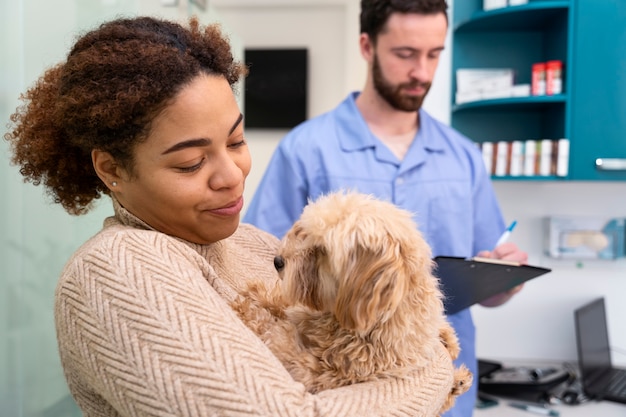Is Your Pet Not Eating? Causes and When to Call a Vet


Is Your Pet Not Eating? Causes and When to Call a Vet
When your pet turns away from their food bowl, it can be worrying and confusing. As a pet owner in Fishers, IN, you want to know if this change is a minor issue or a sign that your companion needs veterinary attention. At Pet Vet Animal Hospital, located at 14065 Mundy Dr, Fishers, IN 46038, our veterinary team understands how stressful it can be to see your pet experience a loss of appetite.
This blog will help you understand why your pet may not be eating, how to recognize when appetite loss is a cause for concern, and what steps you should take. We will discuss common causes of appetite loss in pets, practical tips you can try at home, and when it’s time to schedule an appointment with our veterinarians. You will also learn about the importance of a wellness examination and how veterinary diagnostics in Fishers, IN can play a crucial role in uncovering the root of your pet’s eating issues. Whether you are searching for a “vet near me” or want to know more about pet diagnostics near me, you are in the right place for trusted guidance.
Recognizing Loss of Appetite in Pets: When Should You Be Concerned?
Noticing that your pet is not eating as much as usual or skipping meals can cause immediate concern. Sometimes, a pet may skip a meal due to minor changes in routine or environment, but ongoing or sudden refusal to eat should not be ignored.
Key symptoms of a problem include refusing food for more than 24 hours, eating noticeably less than normal, appearing interested in food but unable to eat, or displaying changes in behavior such as lethargy, hiding, or vocalizing distress. Cats, in particular, are sensitive to appetite changes, as going without food for even a day or two can lead to serious complications like hepatic lipidosis, a liver condition.
Other warning signs that may accompany appetite loss in pets are vomiting, diarrhea, drooling, weight loss, bad breath, or visible discomfort when eating. If your pet is turning away from both food and treats, or if you notice changes in drinking habits, it’s time to pay close attention. For many pet owners in Fishers, IN and surrounding communities, these scenarios raise questions about whether a wellness examination or pet diagnostic laboratory services in Fishers, IN are warranted.
If you are unsure, remember that any sudden or dramatic change in your pet’s eating habits, especially if paired with additional symptoms, is a clear signal to consult a veterinarian.
Understanding Why Your Pet Is Not Eating: Common Causes
There are many possible reasons behind a loss of appetite in pets. Some causes are minor and easily resolved, while others may require immediate veterinary intervention.
A common cause of appetite loss in pets is dental disease. Painful teeth or gums can make eating uncomfortable or even impossible. Other health-related reasons include infections, gastrointestinal issues, kidney or liver problems, and chronic conditions such as diabetes or thyroid disorders. Pets can also experience appetite changes due to medication side effects or post-surgical recovery.
Environmental and emotional factors play a role as well. Stress from changes in the household, travel, a new pet, or even a change in food brand can lead to temporary disinterest in eating. Seasonal changes in Fishers, IN, such as the onset of hot weather, sometimes affect appetite, particularly in dogs and cats with thick coats.
In some cases, a loss of appetite is a sign that your pet is dealing with a more serious underlying illness. Tumors, immune system disorders, or intestinal blockages are examples of conditions that require urgent attention. Puppies and kittens, as well as senior pets, are at higher risk when they stop eating due to their unique nutritional needs and vulnerability.
Understanding the reason behind your pet not eating is not always straightforward. This is why veterinary diagnostics near me and comprehensive pet exams become so important in getting to the root of the problem.
Treatment and Management: How Pet Vet Animal Hospital Can Help
When you bring your pet to Pet Vet Animal Hospital for a loss of appetite, our veterinarians start with a thorough history and physical examination. We discuss your pet’s recent behaviors, medical history, and any changes in their environment or routine. During your visit, our veterinary team may recommend diagnostic tests such as bloodwork, urinalysis, digital radiology, or fecal analysis to identify infections, organ dysfunction, or underlying diseases.
If dental disease is suspected, a dental examination and possible dental cleaning or extractions may be necessary. Our facility offers a full range of dental services to address painful oral conditions that can directly impact your pet’s willingness to eat.
For pets experiencing appetite loss due to dietary issues or food sensitivities, our nutritional counseling services help you select the right diet and feeding strategy. We work closely with you to create a nutrition plan tailored to your pet’s specific needs, whether that means transitioning to a prescription food, addressing allergies, or managing a chronic condition.
In cases where medical treatment is required, our veterinarians will explain all available options and what you can expect during recovery. This might involve medications to manage pain or illness, supportive care such as fluids or appetite stimulants, or surgery if an obstruction or mass is discovered. Our goal is always to restore your pet’s health and comfort so they can enjoy their meals again.
Prevention and Home Care: Supporting Your Pet’s Appetite
Many steps can help support your pet’s appetite at home and reduce the risk of future problems. Providing a consistent feeding schedule, offering fresh water at all times, and avoiding sudden changes in diet are foundational practices. If you do need to change your pet’s food, introduce the new diet gradually over several days to minimize digestive upset.
Creating a stress-free environment is equally important. Pets can be sensitive to changes in routine, loud noises, or new family members. Ensuring your pet has a quiet, comfortable space to eat without competition or distractions can make a significant difference.
Consider the impact of seasonal changes in Fishers, IN, such as high summer temperatures, which can lead to decreased appetite, especially in dogs. Make sure your pet has access to cool water and shade, and avoid feeding during the hottest part of the day.
Home strategies for encouraging eating include warming your pet’s food to enhance aroma, hand-feeding small amounts, or offering a bland diet (such as boiled chicken and rice) if your veterinarian has advised this approach. Remember that these are short-term solutions, and persistent or severe appetite loss should always prompt a call to your veterinary team.
Our veterinarians are always available to answer questions about nutrition and home care. For ongoing dietary concerns related to appetite loss in pets, our nutritional counseling in Fishers, IN can provide tailored support.
When to Schedule a Veterinary Visit for Loss of Appetite
Knowing when to seek professional help for a pet not eating is crucial. You should schedule an appointment with Pet Vet Animal Hospital if your pet refuses food for more than 24 hours, shows additional symptoms such as vomiting, diarrhea, lethargy, or pain, or if you notice sudden weight loss or dehydration. Puppies, kittens, senior pets, and pets with chronic health conditions are especially vulnerable and should be seen promptly if their appetite changes.
A wellness examination is an essential first step in diagnosing the cause of appetite loss. Through a comprehensive pet exam, our veterinarians can evaluate your pet’s health, recommend appropriate diagnostics, and guide you through the next steps for treatment.
If you are searching for “vet near me” or “pet diagnostic laboratory services in Fishers, IN,” know that our veterinary professionals are here to provide compassionate, expert care by appointment. Timely intervention can mean the difference between a simple fix and a more serious health concern, so never hesitate to reach out.
Take Action: Trust Your Local Veterinary Team in Fishers, IN
A pet not eating is never something to ignore. While minor changes in appetite can happen, persistent or severe loss of appetite in pets often signals a deeper issue that requires professional evaluation. At Pet Vet Animal Hospital, our veterinarians are committed to providing comprehensive pet care and clear guidance every step of the way.
If you notice changes in your pet’s appetite, call us at (317) 792-8919 or schedule a visit to our Fishers, IN location. Our veterinary team is ready to help restore your pet’s health and well-being. Remember, early intervention with a wellness examination or nutritional counseling can make all the difference.
For pet owners searching for the “best veterinarian near me” or looking for trusted pet diagnostics near me, Pet Vet Animal Hospital is your local resource for quality care. Contact us today to keep your companion happy and healthy. If you are ever unsure about your pet’s eating habits or overall wellness, our compassionate team is just a call away, ready to support the pets of Fishers, IN and surrounding communities.
Medical Disclaimer: This blog is for informational purposes only and does not replace professional veterinary evaluation. If your pet is experiencing severe symptoms or has not eaten for more than 24 hours, please schedule an appointment with a licensed veterinarian immediately.



















